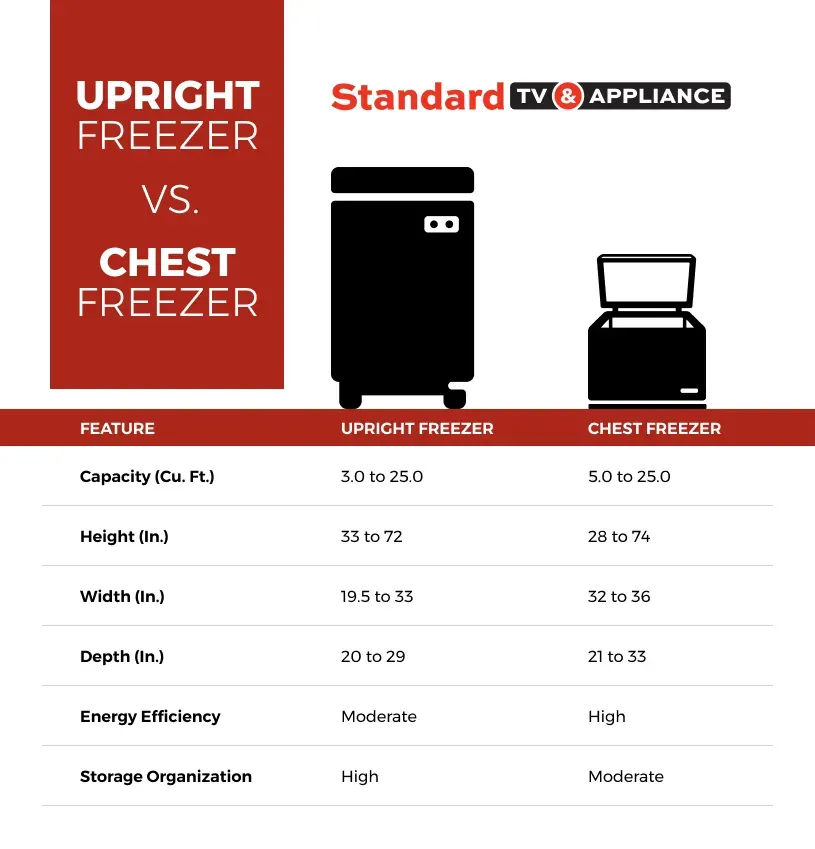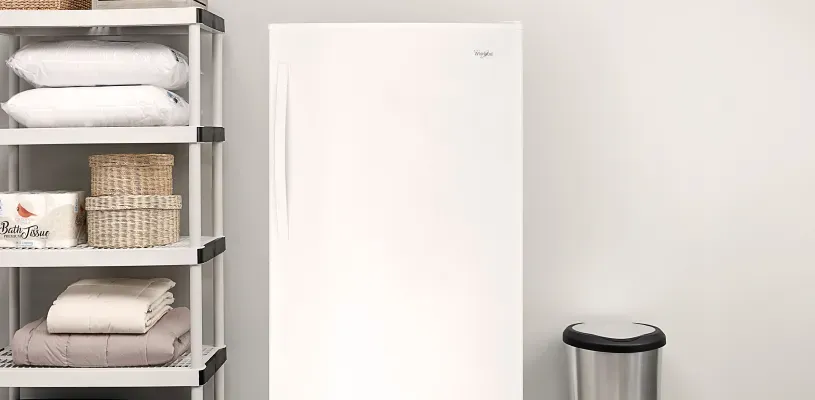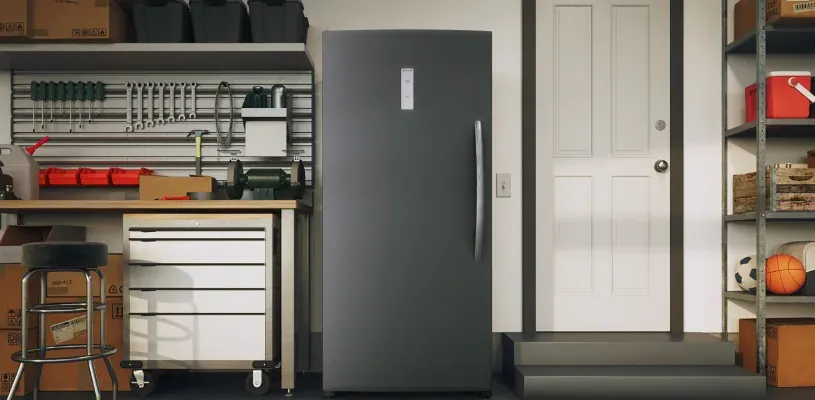Chest, Upright, or Frost-Free: Which Freezer Type is Right for You?
Thu Aug 22 2024
- Refrigerators & Freezers

Finding the best freezers for your home can make all the difference in storing and managing your frozen foods. Whether you’re stocking up on groceries, preserving your garden’s harvest, or just needing extra room for frozen favorites, choosing the right freezer is important. In this guide, we’ll walk you through the benefits of chest freezers and upright freezers so you can find the best fit.
Upright vs. Chest Freezers: A Quick Overview

Consider your storage needs and available space when choosing between an upright freezer and a chest freezer.
- Upright freezers are tall, slim, and designed like a refrigerator, with shelves and compartments for easy organization. They take up less floor space and allow quick access to your items. However, they tend to be less energy-efficient because cold air escapes more easily when the door is opened.
- Chest freezers are wide, horizontal units that open from the top. They offer more usable space, especially for bulky items like whole turkeys. Chest freezers are also more energy-efficient, as their design keeps cold air trapped inside better. However, they require more floor space and can be harder to organize since items are stacked on top of each other.
Upright Freezers: Pros and Cons
Upright freezers are designed like a standard refrigerator, with a vertical door that opens to reveal multiple shelves and compartments. This design makes them convenient for organizing food and grabbing items quickly.
Pros of Upright Freezers
1. Easy Access and Organization: Upright freezers are convenient for organizing frozen goods. With adjustable shelves and door compartments, you can easily separate and categorize your items the way you want.
2. Space-Saving Design: If you have limited space, an upright freezer is a great option. Its vertical design takes up less floor space, making fitting into tight spots like garages or basements easier.
3. Auto-Defrost Feature: Upright freezers come equipped with an auto-defrost feature, which prevents frost buildup and reduces the need for manual defrosting. This feature not only saves you time but also helps maintain the efficiency of your freezer.
Cons of Upright Freezers
1. Less Energy Efficient: Upright freezers tend to consume more energy than chest freezers. This is partly because cold air escapes more easily when the door is opened, causing the compressor to work harder to maintain the desired temperature.
2. Limited Space for Large Items: While upright freezers excel in organization, they can be less accommodating when storing large, bulky items like whole Thanksgiving turkeys or large cuts of meat. The shelves and compartments may limit the available space for these types of foods.
3. Higher Initial Cost: Upright freezers are generally more expensive than chest freezers, with prices often starting around $700 for a standard model. A chest freezer might offer more value for your money if you're on a tight budget.
Chest Freezers: Pros and Cons
Chest freezers are wide, horizontal appliances that open from the top. They offer more usable storage space than upright freezers and are known for their energy efficiency.
Pros of Chest Freezers
1. Plenty of Storage Capacity: Chest freezers typically offer more usable storage space than upright freezers. Their open design allows for the storage of larger items, making them ideal for bulk purchases or large families.
2. Energy Efficiency: Chest freezers are highly energy-efficient, as their design helps to keep cold air trapped inside even when the lid is opened. This reduces the workload on the compressor, leading to lower energy consumption and reduced utility bills.
3. Longer Lifespan: Chest freezers are built to last. With fewer moving parts and a more robust design, they tend to outlast upright freezers by about five years, offering a lifespan of 15 to 20 years.
4. Better Performance in Power Outages: Due to their insulation and design, chest freezers can keep food frozen for longer periods during a power outage—often up to 48 hours—compared to upright freezers.
Cons of Chest Freezers
1. Takes Up More Floor Space: One of the main drawbacks of chest freezers is their size. They require more floor space and headroom, which can be challenging in smaller areas.
2. Hard to Organize: While chest freezers offer a lot of space, they can be challenging to organize. Items often get stacked on top of each other, making reaching food at the bottom difficult. This can lead to forgotten items and food waste.
3. Manual Defrosting Required: Many chest freezers require manual defrosting, which can be time-consuming and tedious. Ice buildup can reduce the freezer’s efficiency and available storage space without regular defrosting.

Frost-Free Freezers: What You Need to Know
Frost-free freezer, available in both upright and chest designs, have a mechanism that automatically prevents ice buildup. This feature offers convenience but comes with some trade-offs.
Pros of Frost-Free Freezers
1. No Manual Defrosting: The most significant advantage of frost-free freezers is that they eliminate the need for manual defrosting. The freezer automatically defrosts itself regularly, saving you time and effort.
2. Consistent Temperature: Frost-free freezers maintain a more consistent temperature, which helps prevent freezer burn and keeps your food fresher for longer.
3. Easier Maintenance: Without the need for manual defrosting, maintaining a frost-free freezer is much easier. You won’t have to deal with the hassle of ice buildup or the mess of defrosting.
Cons of Frost-Free Freezers
1. Higher Energy Consumption: The defrosting mechanism in frost-free freezers requires additional energy, which can lead to slightly higher electricity bills. However, the convenience of not having to defrost the freezer manually might outweigh this drawback for many users.
2. Higher Initial Cost: Frost-free freezers tend to be more expensive than manual defrost models. If you’re looking for a cost-effective solution, consider whether the added convenience is worth the extra expense.
Choosing the Best Freezer
When deciding between a chest freezer, upright freezer, or frost-free model, consider your storage needs, available space, and budget. Here’s a quick recap to help guide your decision:
- Choose a Chest Freezer if you need a large storage capacity, want energy efficiency, and don’t mind manual defrosting. A chest freezer like the GE® ENERGY STAR® 15.7 Cu. Ft. Manual Defrost Chest Freezer (Model: FCM16DLWW) is great for bulk storage and is more cost-effective in the long run. If you need more space, consider the Whirlpool 16 Cu. Ft. Convertible Chest Freezer (Model: WZC5216LW) for three storage levels.
- Choose an Upright Freezer if you prefer easy access and organization, have limited floor space, and want a freezer with an auto-defrost feature. An upright freezer like the Frigidaire 20.0 Cu. Ft. Upright Freezer (Model: FFUE2024AN) is perfect for smaller households or those who need to maximize vertical space.
- Choose a Frost-Free Freezer if you want a low-maintenance option that automatically prevents ice buildup. A frost-free freezer like the Whirlpool 19.7 Cu. Ft. Frost-Free Upright Freezer (Model: WZF79R20DW) offers convenience and consistent performance, though it may come at a higher price and energy cost.

Explore Freezers at Standard
Picking the right freezer, whether it’s a chest, upright, or frost-free model, really depends on what you need, how much space you have, and what works best for you. Each type has its own perks, so choosing carefully will help you find the one that fits your life just right.
If you’re still unsure which type of freezer is right for you, visit one of our appliance store locations in Portland, OR, or contact us. We're here to help you find the perfect freezer that fits your lifestyle and home. Standard TV & Appliance also offers a wide selection of in-stock appliances, including refrigerators, dishwashers, ovens, ranges, and more from trusted brands like Bosch, KitchenAid, and GE Profile.
Related readings from our blog:
- French Door Refrigerators vs Side by Side
- Your Guide to Choosing the Best Refrigerator in 2024
- The Best Brand of Refrigerators in 2024
FAQ: Commonly Asked Questions About Freezers
What is the difference between a chest freezer and an upright freezer?
A chest freezer is a large, horizontal unit that opens from the top, offering more storage space for large items. An upright freezer stands vertically, with a front-opening door and shelves for easier organization.
What is an upright freezer's advantage compared to a chest freezer?
Due to their vertical design with shelves and compartments, upright freezers are easier to organize and access. They also take up less floor space, making them ideal for smaller areas.
What type of freezer is best?
The best freezer type depends on your needs. Chest freezers are ideal for bulk storage and energy efficiency, while upright freezers offer convenience and organization. Frost-free models provide hassle-free maintenance.
Which style of freezer is the most energy efficient?
Chest freezers are generally the most energy-efficient due to their design, which minimizes cold air loss when opened.
What are the disadvantages of a chest freezer?
The main disadvantages of a chest freezer include the need for manual defrosting, difficulty organizing items, and the larger amount of floor space it requires.
Why do chest freezers last longer than upright freezers?
Chest freezers typically last longer because they have fewer moving parts and a more straightforward design, which reduces wear and tear on the compressor.
Related Articles
Welcome to our website! As we have the ability to list over one million items on our website (our selection changes all of the time), it is not feasible for a company our size to record and playback the descriptions on every item on our website. However, if you are an American with a disability we are here to help you. Please call our disability services phone line at 309-691-4100 during regular business hours and one of our kind and friendly personal shoppers will help you navigate through our website, help conduct advanced searches, help you choose the item you are looking for with the specifications you are seeking, read you the specifications of any item and consult with you about the products themselves. There is no charge for the help of this personal shopper for any American with a disability. Finally, your personal shopper will explain our Privacy Policy and Terms of Service, and help you place an order if you so desire.
Copyright © 2009 - 2025 Company All Rights Reserved.
This site is protected by reCAPTCHA and the Google Privacy Policy and Terms of Service apply.

